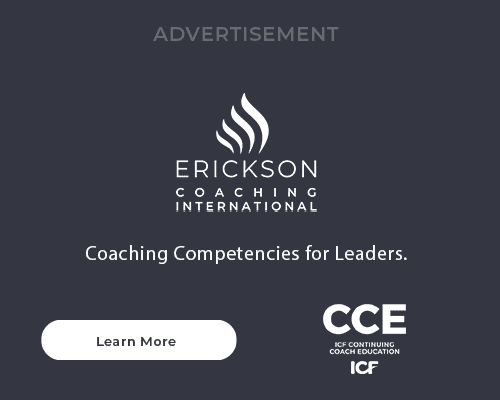Why a Coach Cannot Create Awareness for the Client
In my years as a coach trainer and Mentor Coach, I’ve found that many practitioners struggle with the eighth ICF Core Competency, which calls on them to “create awareness.”
The true purpose of any coaching conversation is to create a safe, supportive environment where clients can explore and uncover what they may not have conscious access to about themselves, their work, or some other aspect of their lives. Usually, there is a gap between where the client is now and where she desires to be. The coach plays an important role in creating the conditions for awareness to emerge, so the client can close that gap and move toward the desired outcome.
If you’ve ever been coached by someone who has drawn wisdom out of you that you never thought you possessed, you know what a joyful high that is. When I have that experience, I find it easy to determine what steps to take next. As a coach and as someone who listens to a lot of coaching sessions, I am always delighted when I hear clients gain awareness, which increases their energy and most often leads to knowing what to do next. It’s truly the juice that makes coaching so rewarding for me: witnessing unfolding awareness that turns into empowered action.
For coaches who struggle to help their clients create awareness, focusing on another ICF Core Competency—that of coaching presence—may be the key to taking their skills to the next level.
Coaching Presence: The Key Competency
The core competency of coaching presence is the bridge between coach and the client because it’s about being fully present, fully conscious and in spontaneous relationship with the client.
It takes practice to be fully present with your clients; i.e., to listen with your whole self to how they speak about their successes as well as their challenges. You are listening at many levels at once—for the words clients use, what their tone of voice or body language might be conveying, what emotions they might be experiencing, and their self-talk and beliefs about their situation. You must pay attention to patterns of thinking and behaving and listen with your full senses, including your gut or intuition. Then you need to discern if what you are sensing is a bias you have, or whether it’s something you can share with the client. If you do have a bias, and you still feel it would serve the client to hear what you are sensing or observing, then you must own your bias with the client.
Starting With Self-awareness
Self-awareness is crucial to cultivating coaching presence, especially when it comes to identifying our own biases. It’s through self-awareness that we begin to understand how our own thinking can limit our clients and their ability to gain the awareness they desire in order to move forward toward their desired outcomes.
For coaches to be of full service to their clients, they need to pay attention not only to their clients’ ways of processing their thoughts and feelings, but also to their own. We are limited in our ability to create the potential for awareness to occur by our own mindsets and biases as human beings. As coaches, we need to become aware of our biases—how we listen, what we listen for, what we include and what we exclude so we can be more purely present as vessels listening for and receiving the whole of our clients.
Emerging Awareness
When the coach is fully present and has highly attuned sensory perception and listening, it’s more likely she will ask a powerful question of the client or make a direct observation that prompts deeper thinking.
The coach’s role is to provide an environment where there is potential for awareness to emerge. The coach cannot create awareness for the client or have awareness on behalf of the client. Sometimes a coach will say something like, “Wow, that’s powerful.” Just because the coach thinks it’s powerful doesn’t mean the client does. In these moments, a coach runs the risk of taking away the client’s opportunity to make her own connections and have the joy of awareness come through her.
You will know the client is experiencing emerging awareness if she is silent after you make an observation or ask a question and then says something like, “Hmmmm … let me think about that.” She might even say, “That’s a great question.” Or she may say nothing at all: Often, you know awareness is emerging when the client becomes quiet or reflective.
As the coach, you want to be present to the signs of emerging awareness and give your client the space to think and reflect more. Be totally present and just listen. Coaches often miss these moments of gold because they’re still talking or thinking of what they want to say next. You are missing the very point of coaching when you step on or over emerging awareness, or when you are unconscious to what is occurring for the client.
Allow the client to process her thoughts or feelings. After a while, if the client doesn’t say anything, you might want to ask a question, such as, “May I ask what that question is revealing to you?” Or if the client becomes quiet and reflective, you may want to inquire of the client, “May I ask what you are thinking (or feeling) right now?”
From Awareness to Action
Once emerging awareness has been explored, it’s often appropriate to ask a question around designing actions, such as, “What would you like to do with that new awareness?” Coaches often miss the opportunity to see if the client wants to create an action—even if the action is simply to take more time to reflect on what has emerged. When you are fully present, you will sense whether it’s the right time to ask the client if she’s ready to move forward, or if she wants to stay with the emerging awareness. Partner with the client and ask her how she wants to move forward.
The ultimate purpose of coaching is to support our clients as they gain awareness of how to move forward toward their desired outcomes. We serve our clients best when we engage in our own self-discovery work to uncover our own biases in how we listen. We owe it to our clients to be fully present to hearing their unique voice and tapping their greatness. When we listen with our whole selves and with clients as our full focus, we are more likely to call forth a powerful question that leads to emerging awareness. When indicated, be quiet, stay present and allow your clients to wrestle with that awareness and decide what actions to take. This is the joyful dance of coach and client partnering together for the client’s increased success.




Fabulous article, I need reminders throughout my coaching years, following my training, no matter how many clients I have coached or how many years I have been in practice. Here I am reminded of staying present to what may be my own “bias” or structure of knowing which may be emerging as I listen to my client. And allowing empty space, time and complete quiet when a client is not talking, after perhaps hearing a question from me or otherwise. Bravo, truly appreciate taking the time to read this wonderful article.
Very well described and presented… you are right, sometimes silence is golden…but not for so long that they are lost.
Very powerful – self awareness, emerging awareness and then action!
Like the image, ‘8’, which can be interpreted as the personal space of the coachee and the coach.
Delightfully put Carly. The other competency I have found to the last coaches get comfortable with is Direct Communication. Would love to hear your thoughts on that I’m another post. Tony
Thanks for your comments. I appreciate hearing you resonate with what I wrote, and also gain some new awareness!
Tony, you ask about Direct Communication. I agree with you that it is a misunderstood competency and is a whole other article. In fact, I’m currently crafting a new article for my own blog due out Feb 15 on one of the aspects of DC being how to share personal stories as a coach. The visual language of the client can inform metaphor and analogy. And a short story that is relevant for the client, whether that be a parable, or saying, or something from your own experience…. there is an art to telling these stories that keeps the focus on the client and lets the client determine what you shared had any relevance to them..
Thank you Carly for your article on the role of awareness in coaching processes. It’s a very close description to what I have learned in my Gestalt education and I integrate this in my work äs à coach successfully.
Love it!
Thank you!
Nice post Carly.
This has always been my biggest challenge. Deepening the awareness for the client.
You’ve given me a few things to put into action.
Thanks.
Thanks Carly for your thoughtful article on Coaching Presence. I agree that this particular core competence is the cornerstone or pillar upon which we develop our skillful means.
Where I have been focusing with coaches is the “how to develop” a coaching presence. That’s why I’m offering a Mastering A Centered Presence program (24 CCEUS from ICF). Building that presence is done from the inside out, not the outside in.
It’s nice to meet you Carly.
Happy Trails,
Rhona
Excellent article Carly. Personally I prefer to call the competency Exposing Awareness instead of creating awareness, in line with your comments.
Also I have found that once awareness has emerged, the client seems to automatically move into considering actions to apply it and I do not need to ask for them. It just seems to be the natural flow of the cycle from internal to external and yes, Coaching Presence AND holding the space of partnership and connected emergence is essential.
Thank you again for bringing this to the attention of all of us.
Refreshing read. It liked the part, “The Coach cannot create awareness for the client….”simply put but so true!!
Refreshing read. It liked the part, “The Coach cannot create awareness for the client….”simply put but so true!!
Xanax How Log In Your System Xanax Causing Parkinson’s Jada Pinkett Xanax Make Me Gain Weight buy xanax 2mg online. Lexapro Generic For Xanax Xanax Effect Duration Interstitial Cystitis Xanax Xr Weight Gain Xanax Online . Xanax 500 Micrograms Microcrystalline Cellulose Xanax Rapid Detox . Xanax And Pseudoephedrine Oxycontin Versus Xanax And Tussionex Xanax Contraindications Zoloft And Xanax Interactions Xanax Seizures Withdrawal Symptoms Xanax Bars Outside System
A Challenge for the coach: to have a high degree of self awareness so that one is able to create a safe and secure environment where the coachee is able to develop his /her self-awareness that will in turn, allow movement towards achieving desired outcomes. Hence BOTH achieve most satisfactory, developmental outcomes: indeed, a ‘win win’ situation!